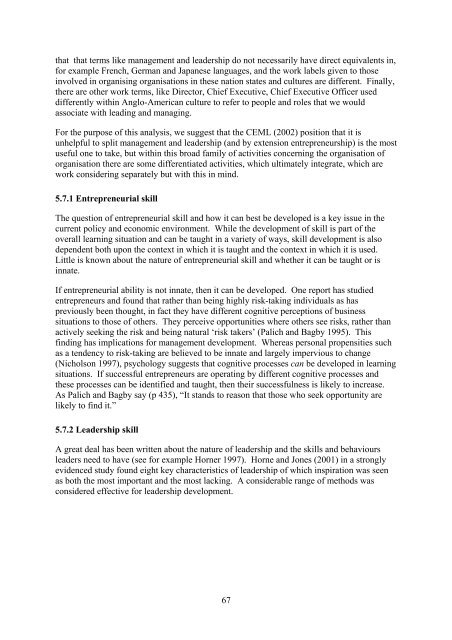The Development of Management and Leadership Capability and its ...
The Development of Management and Leadership Capability and its ...
The Development of Management and Leadership Capability and its ...
You also want an ePaper? Increase the reach of your titles
YUMPU automatically turns print PDFs into web optimized ePapers that Google loves.
that that terms like management <strong>and</strong> leadership do not necessarily have direct equivalents in,<br />
for example French, German <strong>and</strong> Japanese languages, <strong>and</strong> the work labels given to those<br />
involved in organising organisations in these nation states <strong>and</strong> cultures are different. Finally,<br />
there are other work terms, like Director, Chief Executive, Chief Executive Officer used<br />
differently within Anglo-American culture to refer to people <strong>and</strong> roles that we would<br />
associate with leading <strong>and</strong> managing.<br />
For the purpose <strong>of</strong> this analysis, we suggest that the CEML (2002) position that it is<br />
unhelpful to split management <strong>and</strong> leadership (<strong>and</strong> by extension entrepreneurship) is the most<br />
useful one to take, but within this broad family <strong>of</strong> activities concerning the organisation <strong>of</strong><br />
organisation there are some differentiated activities, which ultimately integrate, which are<br />
work considering separately but with this in mind.<br />
5.7.1 Entrepreneurial skill<br />
<strong>The</strong> question <strong>of</strong> entrepreneurial skill <strong>and</strong> how it can best be developed is a key issue in the<br />
current policy <strong>and</strong> economic environment. While the development <strong>of</strong> skill is part <strong>of</strong> the<br />
overall learning situation <strong>and</strong> can be taught in a variety <strong>of</strong> ways, skill development is also<br />
dependent both upon the context in which it is taught <strong>and</strong> the context in which it is used.<br />
Little is known about the nature <strong>of</strong> entrepreneurial skill <strong>and</strong> whether it can be taught or is<br />
innate.<br />
If entrepreneurial ability is not innate, then it can be developed. One report has studied<br />
entrepreneurs <strong>and</strong> found that rather than being highly risk-taking individuals as has<br />
previously been thought, in fact they have different cognitive perceptions <strong>of</strong> business<br />
situations to those <strong>of</strong> others. <strong>The</strong>y perceive opportunities where others see risks, rather than<br />
actively seeking the risk <strong>and</strong> being natural ‘risk takers’ (Palich <strong>and</strong> Bagby 1995). This<br />
finding has implications for management development. Whereas personal propensities such<br />
as a tendency to risk-taking are believed to be innate <strong>and</strong> largely impervious to change<br />
(Nicholson 1997), psychology suggests that cognitive processes can be developed in learning<br />
situations. If successful entrepreneurs are operating by different cognitive processes <strong>and</strong><br />
these processes can be identified <strong>and</strong> taught, then their successfulness is likely to increase.<br />
As Palich <strong>and</strong> Bagby say (p 435), “It st<strong>and</strong>s to reason that those who seek opportunity are<br />
likely to find it.”<br />
5.7.2 <strong>Leadership</strong> skill<br />
A great deal has been written about the nature <strong>of</strong> leadership <strong>and</strong> the skills <strong>and</strong> behaviours<br />
leaders need to have (see for example Horner 1997). Horne <strong>and</strong> Jones (2001) in a strongly<br />
evidenced study found eight key characteristics <strong>of</strong> leadership <strong>of</strong> which inspiration was seen<br />
as both the most important <strong>and</strong> the most lacking. A considerable range <strong>of</strong> methods was<br />
considered effective for leadership development.<br />
67
















